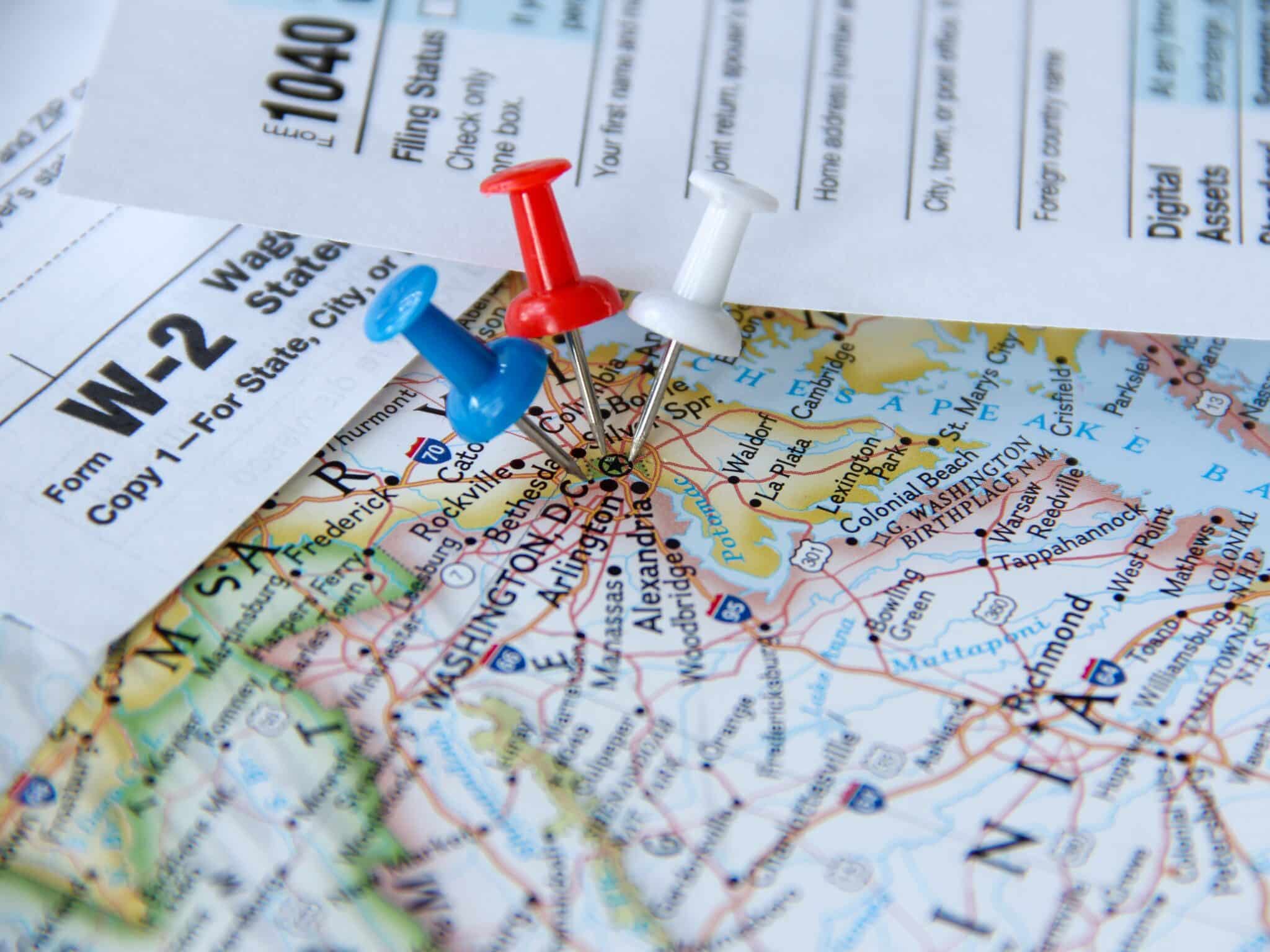When retirement is on the horizon, many active adults dream of relocating to a prime destination with a mild climate and ample entertainment opportunities. With careful consideration, most retirees on a fixed income can afford the cost of living in some of the nation’s most popular retirement destinations. Whether you’re downsizing for retirement or hoping to live in the lap of luxury, it’s essential to consider how retirement taxes will affect your budget and your ability to maintain your ideal retirement lifestyle.
Since retirement taxes vary by state, your location plays a pivotal role in how far you can stretch your budget. By learning more about how taxes affect your retirement income and the most tax-friendly states for retirees, you can align your budget with your dream retirement lifestyle.
How Taxes Affect Retirement Income

The amount of taxes you pay on your retirement income can significantly affect your budget. State taxes on retirement income vary across the U.S. Some states fully exempt retirement income from taxation while others impose specific taxation regulations on retirement income, including Social Security benefits, IRAs, 401(k) plans, pensions, and military retirement income. Other state taxes, such as property taxes, sales tax, and estate taxes, can also impact your cost of living and how far you can stretch your budget.
In general, states can tax pensions, annuities, traditional IRAs, 401(k)s, 403(b)s, and 457(b)s. Typically Roth IRAs, Roth 401(k)s, municipal bonds, and cash value life insurance are considered tax-free income as long as you meet certain conditions. States with no income tax and those that offer breaks for seniors can substantially reduce tax requirements, allowing you to get more from your income.
Best Tax States for Retirees

The best tax states for retirees have no income tax or don’t tax typical retiree income sources like Social Security, pension or retirement account withdrawals, and military retirement income. However, these types of income will still be subject to federal taxes. Some states offer additional benefits like senior property tax relief programs. According to SmartAsset, these are the most tax-friendly states for retirees.
Alaska
Alaska has no state income tax, no state sales tax, and no estate and inheritance taxes. This means typical retirement income sources are not taxed by the state. Although there is no statewide sales tax, local municipalities can levy sales taxes, increasing the cost of necessities. The average property tax rate in Alaska is 1.07% which is lower than many other states. The Alaska Senior Citizen Exemption also makes homeowners 65 and older exempt from municipal taxes on the first $150,000 of assessed value of their property. Residents of at least one year also receive an annual permanent fund dividend ($1,702 for 2024). While Alaska’s tax climate is ideal for retirees, many will wish to avoid the polar climate with very cold and snowy winters.
Florida
A top destination for retirees, Florida also has the advantage of no state income taxes, estate taxes, and inheritance taxes. The statewide sales tax is 6% and localities can add as much as 2%. However, groceries, prescription drugs, and some other necessities are tax-exempt, easing the burden considerably. In Florida, the average effective property tax rate is 0.82%, which is lower than the national average. Florida residents age 65 and older who meet certain criteria can also receive an extra homestead exemption from some city and state governments.
Georgia
Georgia has a flat income tax rate of 5.49%. However, the state does not tax Social Security retirement benefits and provides a maximum deduction of $65,000 per person on all types of retirement income for people 65 and older. Georgia’s state sales tax rate is 4% and the average local sales tax rate is 3.35%. However, groceries are exempt from state tax. Georgia’s property tax is 0.92%, just slightly over the national average. Georgia also has no estate or inheritance taxes.
Nevada
Nevada has no state income taxes, a fairly low median property tax rate, and no estate or inheritance taxes. The statewide sales tax rate is 4.6% and localities can add as much as 3.55%. However, groceries and prescription drugs are exempt, making basic necessities more affordable. Nevada also usually offers a yearly tax holiday, called “Nevada Day” which is observed on a Friday and the Saturday and Sunday immediately following. The median property tax rate in Nevada is 0.59%, which is significantly lower than the national average.
Worst Tax States for Retirees

States that offer minimal to no retirement income tax benefits can increase the cost of living for active adults. Many of the worst tax states for retirees also have high sales, property, estate, and inheritance tax rates.
California
While the Golden State might offer a desirable climate and popular entertainment options, California is significantly less tax-friendly than most states. While there is no state tax on Social Security income, California fully taxes income from retirement accounts and pensions (including military retirement) at some of the highest rates in the country. State income tax rates fall into brackets which range from 1% for the lowest income earners ($10,099 for single filers and up to $20, 198 for joint filers) to 14.4% for residents with income exceeding $1 million.
California also adds a state penalty of 2.5% on top of the 10% federal penalty for early withdrawals from retirement plans. However, California offers a senior income tax exemption that allows residents over 65 to double the standard exemption.
The cost of living in California can also be expensive for retirees. State tax is 7.25% and localities can add as much as 4.75%. However, groceries and prescription drugs are tax-exempt. The average effective property tax rate is only 0.71%, but median property taxes are still over $4,500. California has no estate tax or inheritance tax.
Rhode Island
Rhode Island taxes most retirement income, including Social Security retirement benefits. The state’s income tax rate is graduated, ranging from 3.75% to 5.99%. Military and Railroad Retirement benefits are tax exempt and Social Security retirement benefits are exempt for retirees with income below thresholds set by the state. Taxpayers can also exclude up to $20,000 of income ($40,000 for joint filers) from annuities and pensions (excluding IRAs). Rhode Island’s state sales tax is 7%, but localities do not impose added sales tax. However, groceries, clothing, and prescription drugs are exempt from sales taxes. The property tax rate in Rhode Island is 1.23%, which is substantially higher than the national average and home values are often high as well. Rhode Island doesn’t have an inheritance tax but has an estate tax of 0.8% to 16% for estates valued at more than $1,733,264.
Vermont
Vermont taxes most forms of retirement income, including Social Security retirement benefits and income from most types of retirement accounts. However, an exemption for Social Security income is available when income is less than $65,000. Vermont has a graduated state income tax rate ranging from 3.35% to 8.75%. Vermont’s state sales tax rate is 6% and localities can add up to 0.36%. However, groceries, prescription drugs, and clothing are exempt. The state property tax rate is 1.56%, which is significantly higher than the national average. However, homeowners with a household income lower than $128,000 who meet the criteria can get a property tax credit of up to $8,000.
Finding the Right Balance for Your Retirement Lifestyle
Most retirees are on a fixed income, making it essential to find ways to stretch your budget. Choosing a tax-friendly state for retirement can help you reduce costs on essentials and allow you to participate in the lifestyle you’ve always longed for. Along with learning about the local tax rates in your preferred retirement destinations, considering the cost of living and home prices in the area can help you save. Many 55+ communities offer affordable housing with multiple on-site amenities in tax-friendly states for seniors. Visit 55places.com to find your ideal retirement community.








